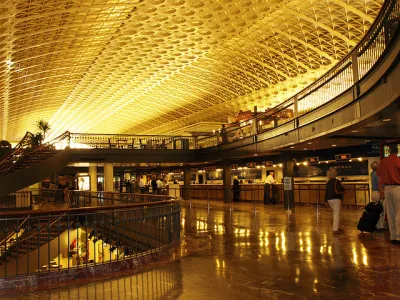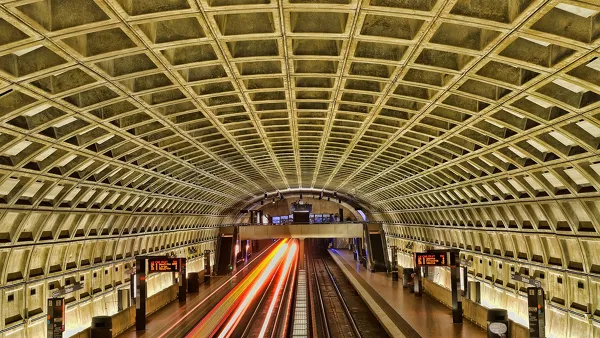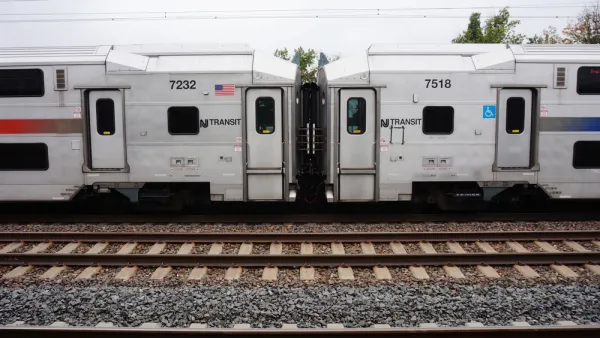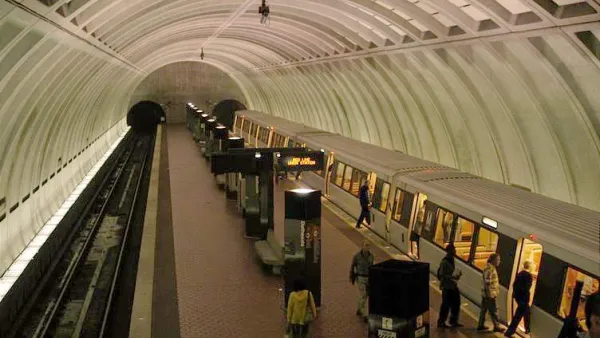Flat fares, reduced wait times, and extended late-night service are all part of a package of changes meant to bring riders back and adjust to post-pandemic travel patterns.

Washington, D.C.'s transit system is getting a major overhaul that officials hope will entice new and old users and boost ridership, reports Jake Blumgart. Because the pandemic upended the traditional workday commute, "policymakers decided to make aggressive changes to pivot away from a schedule that prioritizes traditional rush hour riders. Metro has the third largest heavy rail system in the U.S. and runs the country’s sixth largest bus system, so its policy shifts are likely to be noted by its counterparts and could be pace-setting for the larger public transport sector."
Among the sweeping changes, "[w]eekend trips will universally be priced at $2 a ride, as opposed to the usual model based on distance traveled. Transfer fees that heavily penalize lower-income riders (who don’t tend to live next to rail stops) will be eliminated. The price of bus passes will fall, while frequencies on 36 bus lines will be increased." The changes also include reduced wait times on the system's most heavily used line and extended late night service.
"In determining how to make changes, Metro policymakers studied where ridership remained strongest even during the pandemic’s worst. They saw that low-income riders and those without access to a car continued to use public transit heavily, as did many essential workers in the health-care and government fields. As vaccinations spread, and restaurants began to recover, they also saw increased demand at night from food service workers," a segment traditionally underserved by transit options.
The funding gap created by last year's plummeting ridership "is being filled by the generous operating subsidies provided by the federal government in the various rescue packages passed by Congress in 2020 and early 2021," but "Metro is planning for the end of those federal operating subsidies."
As the first major city to implement such drastic changes after the COVID-19 pandemic, D.C. could serve as "a model for other parts of the country."
FULL STORY: Big Changes Coming to D.C.’s Transit to Boost Ridership

Analysis: Cybertruck Fatality Rate Far Exceeds That of Ford Pinto
The Tesla Cybertruck was recalled seven times last year.

National Parks Layoffs Will Cause Communities to Lose Billions
Thousands of essential park workers were laid off this week, just before the busy spring break season.

Retro-silient?: America’s First “Eco-burb,” The Woodlands Turns 50
A master-planned community north of Houston offers lessons on green infrastructure and resilient design, but falls short of its founder’s lofty affordability and walkability goals.

Test News Post 1
This is a summary

Analysis: Cybertruck Fatality Rate Far Exceeds That of Ford Pinto
The Tesla Cybertruck was recalled seven times last year.

Test News Headline 46
Test for the image on the front page.
Urban Design for Planners 1: Software Tools
This six-course series explores essential urban design concepts using open source software and equips planners with the tools they need to participate fully in the urban design process.
Planning for Universal Design
Learn the tools for implementing Universal Design in planning regulations.
EMC Planning Group, Inc.
Planetizen
Planetizen
Mpact (formerly Rail~Volution)
Great Falls Development Authority, Inc.
HUDs Office of Policy Development and Research
NYU Wagner Graduate School of Public Service




























